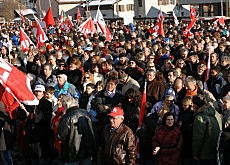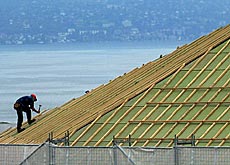Unia pushes for strengthening of SMEs

Switzerland's main trade union, Unia, has called for measures to promote small and medium-sized enterprises (SMEs) – the backbone of the country's economy.
In its first economic policy paper, the organisation targets overpriced imports of raw materials and energy prices, and warns companies against cutting salaries in a bid to remain competitive.
Unia co-president Renzo Ambrosetti said SMEs provided two-thirds of the country’s jobs but were often neglected by politicians and economic experts.
He said some sectors offered more apprenticeships than the banking industry and called for increased efforts to provide further education and innovation to increase productivity.
Ambrosetti also called for early retirement schemes and a reduction of the administrative burden on SMEs.
Unia came out against salary reductions, in particular those achieved by employing cheap labour from eastern Europe and undercutting standard wages.
He said it was crucial to keep up checks introduced as part of a bilateral accord with the European Union.
Eased restrictions
Labour restrictions were eased in 2002 for citizens from EU countries and the accord was later extended to citizens from the ten new EU member states, mainly in eastern Europe.
In its 12-point programme presented on Tuesday, Unia called for unified reduced tariffs for water, waste disposal and infrastructure.
It also urged the federal authorities to strengthen financial cooperatives for SMEs and criticised the high interest rates by commercial banks.
The union said it hoped its proposals would trigger a debate about the credit policy of the banks.
The dispute between the Business Federation, economiesuisse, and the export-oriented engineering industry reflects the different interests of big industries and SMEs, according to Unia.

More
EU bilateral accords
Differences
The association of small and medium-sized enterprises supports in principle Unia’s proposals but said differences remained.
“The programme includes, to some extent, our own demands. But calls for a 13-month’s salary for the catering industry are excessive,” association spokesman Patrick Lucca told swissinfo.
He also described demands for less bureaucratic hurdles as “old hat and empty talk”.
For his part, Unia spokesman Bruno Schmucki dismissed the criticism.
“The unions do more than present demands. We see it as our role to put forward our own ideas to promote the economy and ensure that companies keep their competitive edge,” Schmucki told swissinfo.
swissinfo with agencies
Switzerland’s largest trade union, Unia, is the negotiating partner for some 500 collective work contracts in 80 different sectors of the economy, representing a total of one million employees.
Small and medium-sized enterprises (SMEs) employ up to 250 employees.
SMEs account for 99.7 per cent of Switzerland’s 307,000 companies and 66.8 per cent of the workforce.
In 1998 the economics ministry set up a task force to provide support for SMEs.

In compliance with the JTI standards
More: SWI swissinfo.ch certified by the Journalism Trust Initiative



You can find an overview of ongoing debates with our journalists here . Please join us!
If you want to start a conversation about a topic raised in this article or want to report factual errors, email us at english@swissinfo.ch.